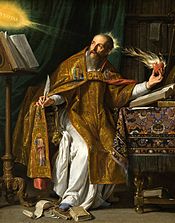Augustinianism
| Part of a series on |
| Augustinianism |
|---|
 |
|
|
Augustinianism is the philosophical and theological system of Augustine of Hippo and its subsequent development by other thinkers, notably Boethius, Anselm of Canterbury and Bonaventure.[1][2][3] Among Augustine's most important works are The City of God, De doctrina Christiana, and Confessions.
Originally, Augustinianism developed in opposition to Pelagianism;[4] it was widespread in medieval western philosophy until the arrival of Thomism and Aristotelianism.[5]
St Augustine. This man of passion and faith, of the highest intelligence and tireless in his pastoral care, a great Saint and Doctor of the Church is often known, at least by hearsay, even by those who ignore Christianity or who are not familiar with it, because he left a very deep mark on the cultural life of the West and on the whole world. Because of his special importance St Augustine's influence was widespread. It could be said on the one hand that all the roads of Latin Christian literature led to Hippo (today Annaba, on the coast of Algeria), the place where he was Bishop from 395 to his death in 430, and, on the other, that from this city of Roman Africa, many other roads of later Christianity and of Western culture itself branched out.[11]
View of humanity
| Part of a series on |
| Catholic philosophy |
|---|
   |
|
"Augustine considered the human race as a compact mass, a collective body, responsible in its unity and solidarity. Carrying out his system in all its logical consequences, he laid down the following rigid proposition as his doctrine: 'As all men have sinned in Adam; they are subject to the condemnation of God on account of this hereditary sin and the guilt thereof'"[12][13]
According to Augustine, even the world and corporeal entities, being fruits of
Ethics
These are the most important values for an Augustinian.[15]
- Love
- Interiority
- Humility
- Devotion to Study and the pursuit of Wisdom
- Freedom
- Community
- Common good
- Humble and generous service
- Friendship
- Prayer
Meta-ethics
Augustine offered the Divine command theory, a theory which proposes that an action's status as morally good is equivalent to whether it is commanded by God.[16][17] Augustine's theory began by casting ethics as the pursuit of the supreme good, which delivers human happiness, Augustine argued that to achieve this happiness, humans must love objects that are worthy of human love in the correct manner; this requires humans to love God, which then allows them to correctly love that which is worthy of being loved. Augustine's ethics proposed that the act of loving God enables humans to properly orient their loves, leading to human happiness and fulfilment.[18]
Just war
The Just war theory is a doctrine that ensure war is morally justifiable through a series of criteria, all of which must be met for a war to be considered just. In Romans 13:4 Augustine claims that, while individuals should not resort immediately to violence, God has given the sword to government for good reason. Augustine argues that Christians, as part of a government, need not be ashamed of protecting peace and punishing wickedness when forced to do so by a government. Augustine asserted that this was a personal, philosophical stance: "What is here required is not a bodily action, but an inward disposition. The sacred seat of virtue is the heart."[19][20]
Happiness
Augustine's ethics is that of ancient
Epistemology
Augustine emphasised the role of divine illumination in our thought, saying that "The mind needs to be enlightened by light from outside itself, so that it can participate in truth, because it is not itself the nature of truth. You will light my lamp, Lord,"[27]
For Augustine, God does not give us certain information, but rather gives us insight into the truth of the information we received for ourselves.
- If we both see that what you say is true, and we both see that what I say is true, then where do we see that? Not I in you, nor you in me, but both of us in that unalterable truth that is above our minds.[28]
Thomas Aquinas criticizes the divine illumination, denying that in this life we have divine ideas as an object of thought, and that divine illumination is sufficient on its own, without the senses. Aquinas also denied that there is a special continuing divine influence on human thought. People have sufficient capacity for thought on their own, without needing "new illumination added onto their natural illumination".[29]
Anthropology
Soul
Saint Augustine was one of the first Christian ancient Latin authors with very clear anthropological vision. Augustine saw the human being as a perfect unity of two substances: soul and body.[30] He was much closer in this anthropological view to Aristotle than to Plato.[31][32] In his late treatise On Care to Be Had for the Dead sec. 5 (420 AD) he insisted that the body pertains to the essence of the human person:
In no wise are the bodies themselves to be spurned. (...) For these pertain not to ornament or aid which is applied from without, but to the very nature of man.[33]
Augustine's favourite figure to describe body-soul unity is marriage: caro tua, coniunx tua – your body is your wife.[34][35][36] According to N. Blasquez, Saint Augustine's dualism of substances of the body and soul doesn't stop him from seeing the unity of body and soul as a substance itself.[32][37] Following ancient philosophers he defined man as a rational mortal animal – animal rationale mortale.[38][39]
Original sin

Augustine wrote that original sin is transmitted by
Augustine's understanding of the consequences of original sin and the necessity of redeeming grace was developed in the struggle against
The Catholic Church accepts the doctrine of original sin as Augustine taught.[50]
Predestination
| Part of a series on | |||||||||||||||||||||||||||
| Augustine of Hippo | |||||||||||||||||||||||||||
|---|---|---|---|---|---|---|---|---|---|---|---|---|---|---|---|---|---|---|---|---|---|---|---|---|---|---|---|
 | |||||||||||||||||||||||||||
| Augustinianism | |||||||||||||||||||||||||||
| Works | |||||||||||||||||||||||||||
| Influences and followers | |||||||||||||||||||||||||||
| Related topics | |||||||||||||||||||||||||||
| Related categories | |||||||||||||||||||||||||||
For Augustine God orders all things while preserving human freedom.[51] Prior to 396, Augustine believed that predestination was based on God's foreknowledge of whether individuals would believe, that God's grace was "a reward for human assent".[51] Later, in response to Pelagius, Augustine said that the sin of pride consists in assuming that "we are the ones who choose God or that God chooses us (in his foreknowledge) because of something worthy in us", and argued that it is God's grace that causes the individual act of faith.[51] Some Catholics dispute that Augustine believed predestination in the latter way, and claim that Augustine affirmed free will in the choice of being saved or not.[52] Theodicy and Free willThe problem of evil is the question of how to reconcile the existence of evil with an omnipotent, omnibenevolent, and omniscient God.[53][54] Augustine develops key ideas regarding his response to suffering. In Augustine rejected the notion that evil exists in itself, proposing instead that it is a privation of (or falling away from) good, and a corruption of nature.[55] He wrote that "evil has no positive nature; but the loss of good has received the name 'evil.'"[56] Both moral and natural evil occurs, Augustine argued, owing to an evil use of free will,[57] which could be traced back to the original sin of Adam and Eve.[58] He believed that this evil will, present in the human soul, was a corruption of the will given to humans by God, making suffering a just punishment for the sin of humans.[59] Because Augustine believed that all of humanity was "seminally present in the loins of Adam", he argued that all of humanity inherited Adam's sin and his just punishment.[60] However, in spite of his belief that free will can be turned to evil, Augustine maintained that it is vital for humans to have free will, because they could not live well without it. He argued that evil could come from humans because, although humans contained no evil, they were also not perfectly good and hence could be corrupted.[61] ComparisonPelagius' teachings on human nature, divine grace, and sin were opposed to those of Augustine, who declared Pelagius "the enemy of the grace of God".[62][63][a] Augustine distilled what he called Pelagianism into three heretical tenets: "to think that God redeems according to some scale of human merit; to imagine that some human beings are actually capable of a sinless life; to suppose that the descendants of the first human beings to sin are themselves born innocent".[65][b] In Augustine's writings, Pelagius is a symbol of humanism who excluded God from human salvation.[63] Pelagianism shaped Augustine's ideas in opposition to his own on free will, grace, and original sin,[67][68][69] and much of The City of God is devoted to countering Pelagian arguments.[70] Another major difference in the two thinkers was that Pelagius emphasized obedience to God for fear of hell, which Augustine considered servile. In contrast, Augustine argued that Christians should be motivated by the delight and blessings of the Holy Spirit and believed that it was treason "to do the right deed for the wrong reason".[71] According to Augustine, credit for all virtue and good works is due to God alone,[72] and to say otherwise caused arrogance, which is the foundation of sin.[73] According to Peter Brown, "For a sensitive man of the fifth century, Manichaeism, Pelagianism, and the views of Augustine were not as widely separated as we would now see them: they would have appeared to him as points along the great circle of problems raised by the Christian religion".
According to Nelson, Pelagianism is a solution to the Reformed theologians) creates a God-centered morality, which, in Leibniz' view "would destroy the justice of God" and make him into a tyrant.[104]
Augustinian philosophers
See alsoNotes
References
Sources
|



